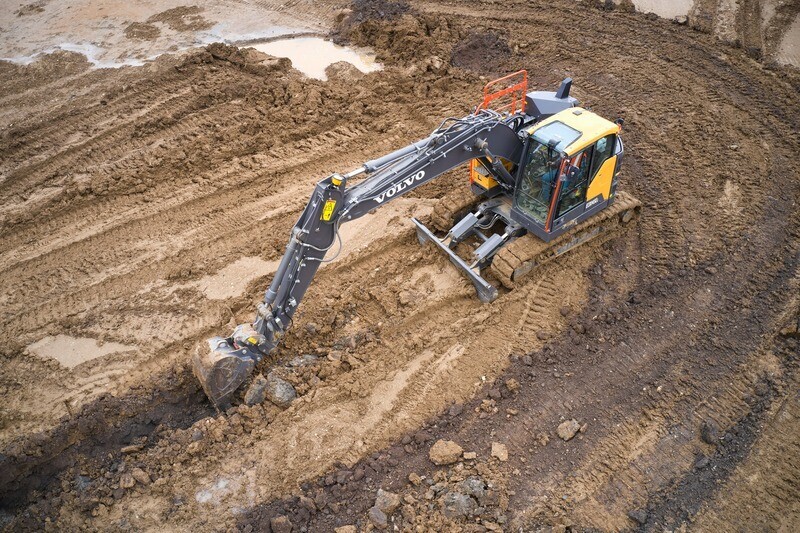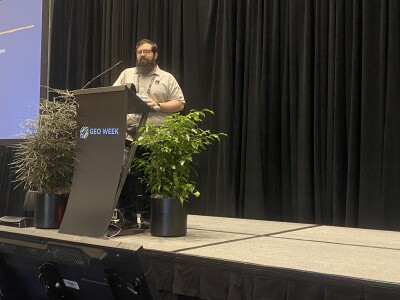Over the last couple of weeks, with the calendar flipping to December and 2024 right around the corner, here at Geo Week News we’ve been looking ahead to the year to come in a couple of different ways. Early in the month, we spoke with Craig Hill of Hexagon to look at some trends we can expect in the surveying industry next year. Moving over to the construction industry, we had a similar conversation around that space with Procore’s Sasha Reed. More broadly, the Geo Week News staff recently put together a list of the trends we’re most excited to watch in 2024.
To round out these forward-looking, end-of-year conversations, Geo Week News turned to Trimble for a high-level conversation about the changing landscape of the year ahead. Speaking with Trimble Applanix’s Kevin Andrews, who is the company’s Director of Land Products, we talked about some changes across the autonomy and overall tech industries, including changing economic environments, the effects of artificial intelligence, and Internet of Things.
A shifting landscape
A theme in all of our conversations, both for these aforementioned articles and other conversations with industry insiders over the last few months, has been that the economic landscape is changing. This has been clear in other ways for many people around the United States and elsewhere over the entire year, but the way technology industries in particular will approach things moving forward has been clear as well. Specifically, we can expect less of a focus – particularly in terms of investment – on the theoretical with favor being shifted towards tangible investments that are already making money.
This came up in our conversation with Andrews, who points to larger economic trends as the driving factor behind this, noting climbing interest rates which tightens budgets. He said, “Companies are forced to really focus on not years ahead anymore, but maybe quarters ahead. It really forces people to focus on, What are my immediate goals? What are my core goals?”
Andrews relays that these trends are not limited to one sector, or one specific section of a given industry either, noting, “From the VCs, to big companies like Trimble, right down to consumers, the same sorts of things are happening where the easier money is drying up a little bit, people are being more cautious, people are being a little smarter about their money. Whether you’re at the grocery store or you’re investing in startup companies, the same logic applies.”
So how does this affect innovation and the autonomy industry? Andrews points to heavy trucking, like deliveries, as a prime example of a space that is being impacted. He notes that back a few years ago during the pandemic, deliveries were needed, which in turn led to more investment in the space. Now, drivers are coming back and there’s less demand for delivering parcels, which isn’t causing investment to go away, but just shift to other industries.
“Where is autonomy saving people money today? Maybe it’s not trucking, but maybe it’s more efficient use of fuel on a farm,” Andrews said. “We’re still seeing things like precision farming grow because it’s becoming a proven technology. We know that if you can only spray the weeds, because we’ve got intelligent cameras, that’s going to change inputs. That’s what I mean by refocusing on things that are making money now. It’s things that are proven, things that will pay off even when times are tough.”
Advances in AI
While a good portion of our conversation with Andrews did center around a more conservative attitude around all of investing right now, it’s no secret that anything involving artificial intelligence bucks that trend. No matter what industry you’re discussing, you can only go so far into a conversation before AI is going to take center stage, and that was no exception here.
Andrews’ background with Applanix means he has plenty of experience within the surveying and mapping industry, which he points out is not exactly new to using AI. “Specifically within my field, within surveying and mapping, and within the autonomy field, AI and machine learning has always been around identifying things and making sense of camera and lidar images,” he told Geo Week News.
That doesn’t insulate these spaces from being changed by AI, though. “What I see as what I think will be an interesting trend is the way that human-machine interfaces are going to very rapidly adapt,” Andrews said. He went on to relay how he’s seen some companies, including within Trimble, where people are “able to sort of ‘talk’ to a computer and have it understand what you meant, not necessarily what you said.” Ultimately, he thinks AI will have the most profound impact in simplifying the process of humans learning how to use machines and bringing that interface along more easily.
More emphasis on the Internet of Things
The final piece that Andrews mentioned as an area to watch in the coming year is one that also came up in our aforementioned conversation with Sasha Reed from Procore, as well as our editorial team’s trends for the coming year, and that is the Internet of Things. As mentioned in those articles, this isn’t exactly a new technology, but it is something that keeps coming up in forward-looking conversations. This, in a way, relates to the first part of our conversation with Andrews about focusing on places where tangible value can be proven, but it’s also a rapidly improving technology and one that is moving in different directions than how many will think about them.
“We recognize the ‘Internet of Things’ terminology from things like a smart refrigerator, and lights that sense you’re coming and learn your patterns, that sort of thing. But really, IoT is really about interconnected systems,” Andrews said. “More and more, we’re starting to use that term to describe cars that are internet connected, and we talk about smart cities where your cars are talking to intersections so that they can optimize traffic, that kind of thing.”
It’s here where all of these conversations converge into one key understanding for the year ahead: Many technologies of the future are here today. This idea of a tightening of the belt has not been limited to this conversation, as there is a clear focus on what is returning on investment. But that idea being coupled with pushes forward in AI being a focus in every conversation, and IoT coming up so much, particularly around smart cities (which was also a topic of conversation with Hexagon as a potential area of focus for surveyors), is telling. These were once more theoretical, pie-in-the-sky technologies, but with so many people in different industries all pointing towards these ideas in lean times, it’s clear that people see the ROI being apparent, and ready to strike today.






